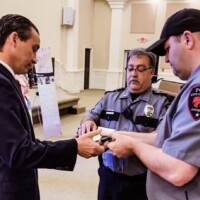
Police Chief Corcoran Wins Approval of Plan To Record Movement Of Central Residents
In a move that raises constitutional issues, Central Police Chief Roger Corcoran proposed and the Central City Council has approved the purchase of seven cameras designed to record the license plate of every vehicle entering the City of Central or moving along certain roads in the city.
The travels of all vehicles would be recorded and accessible, but names of anyone the police chief or his officers place on a ‘hot list’ would automatically be sent to the police department and all officers on duty. This kind of mass surveillance has been condemned by legal scholars as violating the 4th Amendment to the Constitution.
In Carpenter v. the U.S., the Supreme Court ruled the use of ping technology requires a warrant signed by a judge. In that case, law enforcement got data from a cell phone provider showing the defendant’s movements through 13,000 pings from cell towers over a period of 127 days. The U.S. Supreme Court ruled that gathering this kind of information requires a warrant.
At the Central City Council meeting on April 12, Police Chief Roger Corcoran proposed a $25,000 a year contract with Flock Group. Mayor pro-tem Wade Evans said the information “could come in handy” for law enforcement, although he said he was concerned about the potential abuse of the data. He said Flock can track abuse of the system.
However, the council has not passed an ordinance to control how the system would be managed, prevent abuse, or provide criminal penalties for law enforcement who misuse the information.
The system does not currently have facial recognition, he said.
Council members asked questions about how the system could be used to help arrest people with outstanding warrants and bench warrants. Chief Corcoran said it would not be used for misdemeanor warrants.
The chief said any person in the NCIC database could be targeted.
Members of the Council were told the sheriff’s office already has two of the license plate cameras in Central, as do some subdivisions.
Chief Corcoran said all of these would be interconnected and reported automatically to police.
The chief said, “It alerts you and all the officers right away, and everyone in law enforcement knows this person has entered the city.”
City Councilwoman D’Ann Wells had questions and asked that the resolution be deferred until they could be answered. One of her concerns was that the Council had not been given a copy of the contract and that money to pay for the cameras has not been appropriated.
When asked whether the cameras could be mounted on a police vehicle, Chief Corcoran said they could. This would allow us to drive through parking lots and identify cars, he said.
In 2020, law enforcement officers on at least two occasions were spotted photographing the license plates on every car in the parking lot at Life Tabernacle Church in Central. This was at a time when Gov. John Bel Edwards had ordered the public not to attend Life Tabernacle.
Councilwoman Wells said she didn’t understand the rush. “I’m uncomfortable voting for something I haven’t seen,” she said.
In the end, the council voted 6-1 for the resolution to allow the police chief to purchase the cameras with only Wells voting no. Because it was a resolution and not an ordinance, it does not go to Mayor David Barrow to sign or veto. However, under the Lawrason Act which governs cities like Central, the mayor is the only person authorized to sign contracts.
As of Wednesday night, Mayor Barrow had not stated whether he would sign a contract with the Flock Group to purchase the cameras. The Council will still have to vote on whether to fund the program.


 April 21, 2022
April 21, 2022 







No comments yet... Be the first to leave a reply!